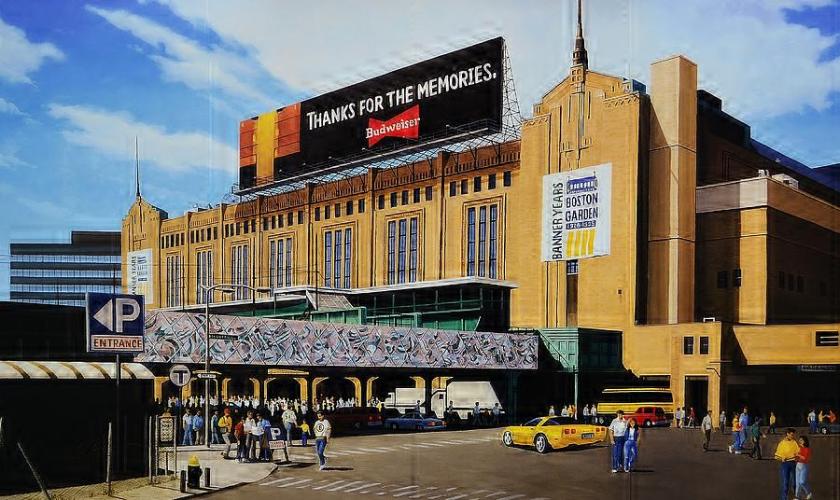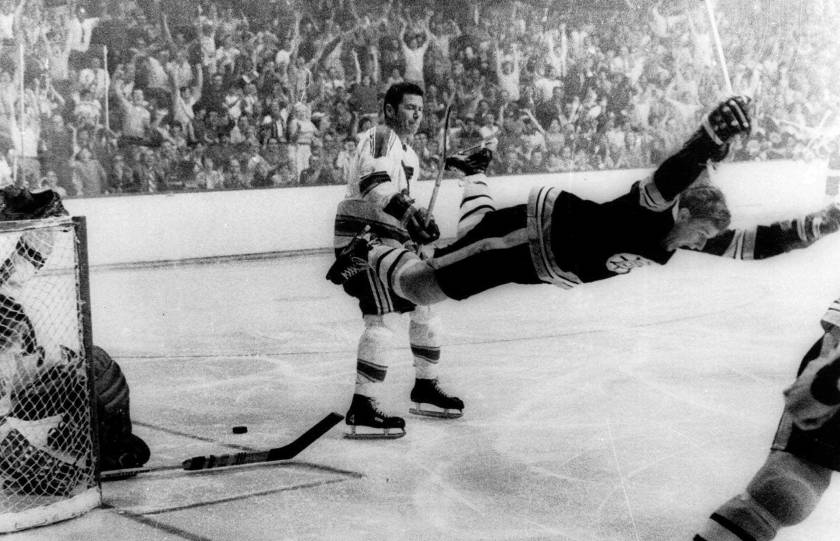Having come of age in this part of the world, it’s hard to imagine anyone over forty never having been to the old Boston Garden.
Originally built as a boxing venue, “The Garden” was then known as the Boston Madison Square Garden.
President Calvin Coolidge flipped a switch at the White House in November 1928, turning the lights on at the brand new arena. Three days later, a crowd of 14,000 watched Dorchester native Dick “Honeyboy” Finnegan take the World featherweight championship away from French boxer Andre Routis, in a ten round decision.
From the earliest days, the Boston Garden was the site of political conventions, tennis matches, roller derbies and bike races. There you could hear the sounds of a Christian revival one night, and a dance marathon the next.
FDR, Winston Churchill and Dwight Eisenhower all delivered speeches from the floor of the Garden. Legend has it that JFK mapped out his political strategy for the 1960 Presidential election, while watching a Bruins game.
I saw my first big-time rock concert, when Aerosmith played the Garden in 1975.
The Boston Celtics played to 16 championships on the old parquet, along with 19 Conference and 15 Division titles.

Five times did the Bruins hold Lord Stanley’s Cup aloft on the home ice of the Garden, adding to 19 Eastern Division championships, two Conference championships, and a President’s trophy.
In the end, obstructed seats and a lack of air conditioning spelled the end for the Boston Garden. On this day in 1995, Cam Neely scored the final goal in a 3-0 victory over the arch rival Montreal Canadiens. There would be no more.
Many of the Greats of Boston hockey were there that night, to take a final skate around the Bruins’ home ice. Johnny Bucyk was on-hand, along with Milt Schmidt. There was Phil Esposito, Ray Bourque and Bobby Orr, and possibly the greatest, though few will remember the name of Normand Léveillé.

A first-round draft pick in 1981, Léveillé scored 33 goals in his first 60 games with the Bruins. There was nothing but potential in that rookie year, but that bright future was never meant to be.
On October 23, 1982, Boston was playing the Canucks in the ninth game of his second season. Léveillé complained of feeling dizzy, and lost consciousness during trainers’ examination . An aneurysm had burst inside of his head. The delicate filaments of his brain were being torn apart, as a spider’s web is destroyed by a garden hose.
Emergency brain surgery was followed by three weeks in a coma. At 19, Normand Léveillé would never play hockey again. He was lucky to be alive.
 Bound to a wheelchair after thirteen years and barely able to stand without aid of a walker, Normand Léveillé came back to the Garden twenty-three years ago tonight, to skate there one last time.
Bound to a wheelchair after thirteen years and barely able to stand without aid of a walker, Normand Léveillé came back to the Garden twenty-three years ago tonight, to skate there one last time.
Let sports reporter Brent Conklin finish this story:
“For the final skate, an ecstatic Léveillé held his cane in front of him, while Bourque, facing Léveillé, pulled him around the ice; the crowd clamored in approval as eyes throughout the Garden filled up with tears.
Léveillé’s girlfriend, Lucie Legare, said at the end of the ceremony: “He said the biggest emotion wasn’t to put on the (Bruins) sweater again, but to have his fellow men there, caring. I cried. It’s just too much.”
“It was the highlight of the day,” Orr said.
Thus ends a long chapter in the history of sports. And although the luxurious Fleet Center becomes the center of attention on Oct. 7 — when the Bruins open their season versus the New York Islanders — to the very last second of the post-game ceremony, memories were still being made and dreams realized at rickety old Boston Garden”.



You must be logged in to post a comment.